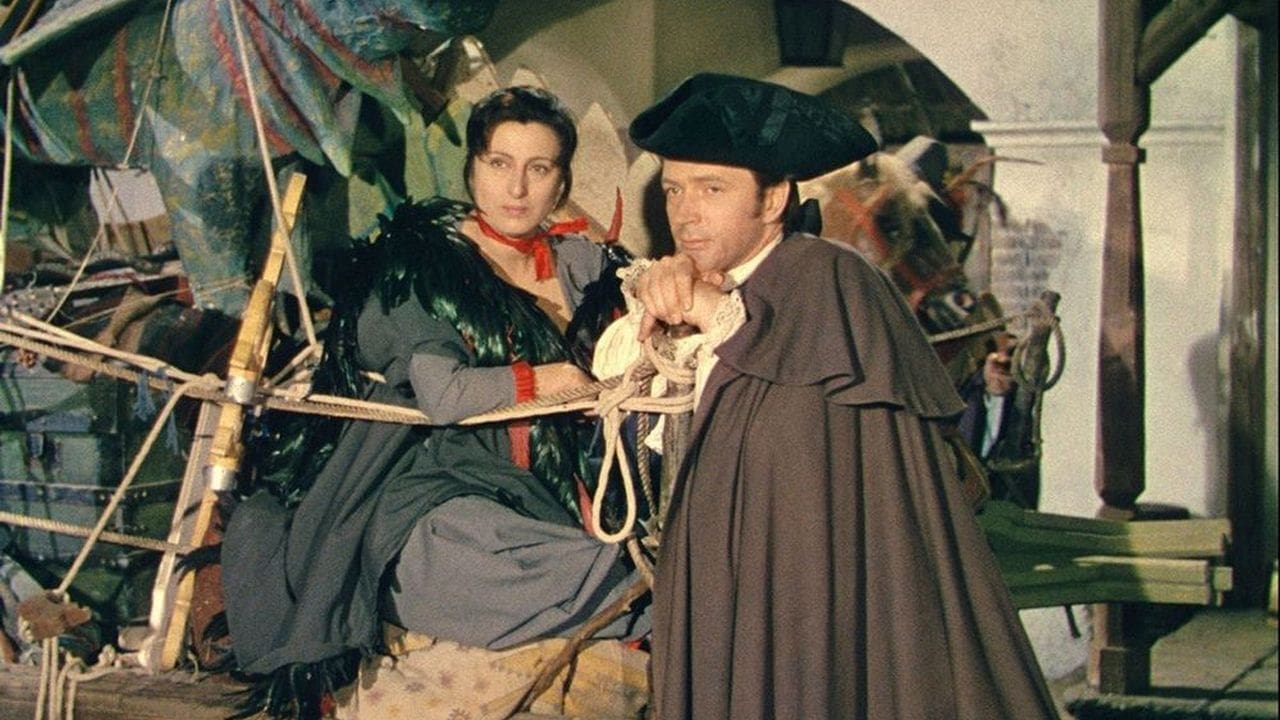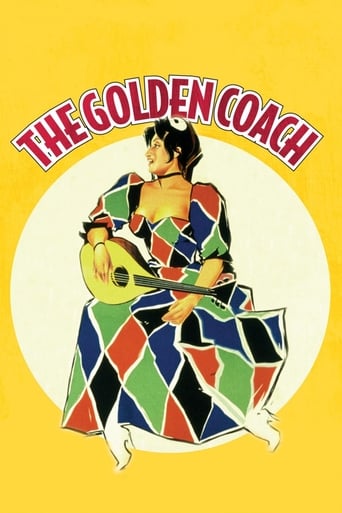Acensbart
Excellent but underrated film
Breakinger
A Brilliant Conflict
Chirphymium
It's entirely possible that sending the audience out feeling lousy was intentional
Raymond Sierra
The film may be flawed, but its message is not.
Michael Neumann
Jean Renoir's colorful English language comedy is not the masterpiece prevailing critical opinion would have you believe ("riotously textural!" raved the Village Voice), but it is a pleasant and entertaining novelty. A spirited Anna Magnani leads a troupe of Italian actors to a Spanish colony in 18th century Peru, where the appreciative Viceroy rewards her talent (and beauty) with the gift of a golden coach, setting off a small political and romantic scandal. It plays for the most part not unlike a literate stage farce, and Renoir emphasizes the theatricality of the story by directing (and shooting) it like theatre, with deliberate, flat compositions and distracting color costumes; the action even begins on a legitimate stage, the walls of which 'disappear' as soon as Renoir's camera dollies into it. The (at the time) newly struck 1992 print, presented by Martin Scorsese, shows obvious evidence of restoration only in the curious epilogue, which brings the story back to its original stage setting, and appears to have been poorly reconstructed on video.
T Y
I saw 'The Golden Coach' twenty years ago in a big screen revival. I don't recall that I liked it or disliked it. Actually, I don't recall much about it at all. So I thought I'd watch it again, now that I have hundreds of really great films under my belt ...and I see why nothing stuck in my head. It's trying very hard to be important; by rejecting the usual Hollywood treatment and pacing. But it dilly-dallies with a static, indifferent structure wherein Anna Maganani pinballs between three men who are after her. If I had the patience I could scour this for the transitory meaning of objects (No thanks, I'll take "The Earrings of Madame de...") but the apparent level of the movie never drew me in, so I'm not especially interested in the underpinnings.I have never understood the appeal of Magnani. She is a a brassy, loud mouth vulgarian, and a turn-off of epic proportions. She's clearly approaching her over-ripe, matronly years here, and the idea that 3 men could fall all over themselves for her is absurd. Her trademark in this film is some full-throated proectile laughter which probably broke a lot of objects downwind. They seem to be cashing in on her laugh. It's as if crowds adored in in a breakout role the previous year (where she laughed once) and this was conceived as the merest excuse to have her laugh like a jackal every 4 minutes.On the set of the Fugitive Kind she was reportedly incensed, and increasingly unhinged because Brando did not find her attractive, nor have a tryst with her. The lady does not seem to have understood her limitations. She was lucky to have the career she did. She peaked with her first film, where she played a care-worn wartime schlub/housewife.
poco loco
Jean Renoir, the masterful creator of such films as Les Regles du Jeu and La Grande Illusion tries his hand at a period piece, set in Spanish ruled Latin America, filmed in English with American and Italian actors. The memorable performance of the film was by its star Anna Magnani as Camilla, an Italian actress who has come to perform with her troupe and is courted by 3 men, a captain in the army, a sports hero matador and the viceroy. Of course the viceroy, with his offer of the Golden Coach starts to win out over the others. We are deftly led through the court life with its jealousies, backbiting, and hypocrisy. Acting is a passion though, even when an actor is considered an outcast. The ending ties together the message of the film as we see Camilla make her choice. The film in interesting and compelling if not powerful.This movie is like this interesting meat pastry that I ate at Sabor Latino in Ann Arbor. Sabor Latino is a cheap, delicious little place on main street that serves Latin American food. I ate this Puerto Rican dish that is made from banana meal that is filled with savory chunks of meat with a delicious sauce and then deep fried. The plantains add an interesting light element to the dish, which is very good. It was filling, different and expertly prepared, but it will not become my favorite dish there (It's hard to beat melted cheese). 6.5/10 http://blog.myspace.com/locoformovies
writers_reign
Occasionally - perhaps about once every other Fall - I catch up with a vintage (vintage in the sense that it was produced way, way back) movie that has attracted rave reviews, albeit not always on its initial release, and find myself asking questions such as WHAT? WHERE is the Style and/or Content? WHY all the fuss? Mensa members reading this will be ahead of me and aware that I have the same problem with this entry. I WANTED to like it, I always want to like a given movie and Renoir isn't exactly chopped liver; no one enjoyed his French Can Can or La Grande Illusion more than I but I did find Le Bete humaine on the so-so side. Here the big problem was Magnani. She is a fine actress no doubt and I myself have seen her give some tremendous performances but the Beauty That Drives Men Mad? I think not. For reasons best known to Renoir and/or his cameraman they have contrived to shoot her in such a way as to suggest she was suffering a bad case of mumps on the floor; tempestuous, yes; volatile, yes; histrionic, yes but incandescent? You've got to be kidding. It was a nice idea to try to replicate the Commedia del Arte and lots of the set-ups are easy on the eye but overall, what's it all about, Alfie.

